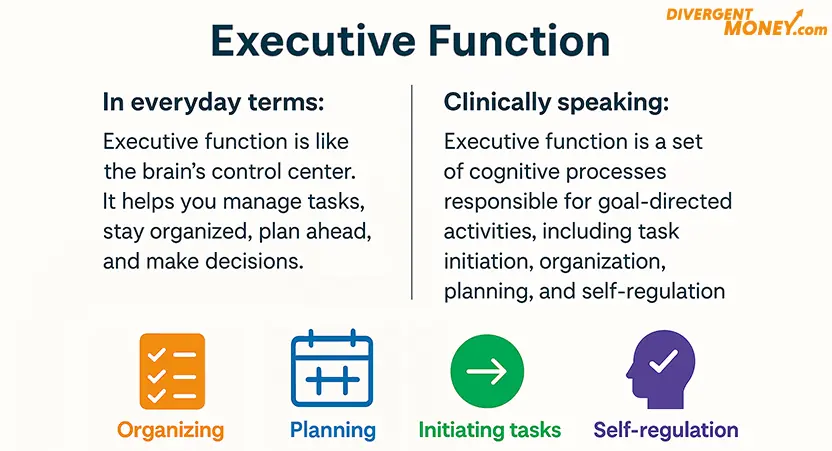Glossary: Executive Function
Executive Function
In everyday terms:
Executive function is like the brain’s control center—it helps you plan, prioritize, remember things, and stay on track with goals. If your brain were a computer, executive function would be the operating system managing all the tabs, apps, and notifications. It’s what helps you shift gears when plans change, resist distractions, and follow through on stuff that matters (even when it’s boring).
If you’ve ever tried to budget, pay bills, or save money, you’ve used executive function—even if you didn’t realize it.
Clinically speaking:
Executive function refers to a set of cognitive processes that allow individuals to regulate their thoughts, emotions, and actions in pursuit of a goal. These processes include working memory, cognitive flexibility, inhibitory control, task initiation, planning, organization, emotional regulation, and self-monitoring.
Executive function plays a central role in managing day-to-day tasks and long-term objectives. It is frequently impacted in individuals with ADHD, autism, traumatic brain injury, and other neurodevelopmental or neurological conditions, leading to difficulties with time management, attention, and goal-directed behavior.

Key Components of Executive Function
1. Working Memory
The ability to hold and manipulate information in your mind over short periods.
Example: Remembering the steps of a budgeting method while applying them to your current expenses.
2. Task Initiation
The capacity to begin tasks without excessive procrastination.
Example: Starting your taxes without putting it off until the deadline.
3. Planning & Prioritizing
The ability to create a roadmap to reach a goal and determine which tasks matter most.
Example: Mapping out how to pay off debt while saving for an emergency fund.
4. Emotional Regulation
Managing emotions to stay focused and avoid impulsive decisions.
Example: Resisting the urge to stress-spend when you’re feeling anxious.
5. Self-Monitoring
Evaluating your performance and adjusting behavior accordingly.
Example: Noticing you’re overspending on food delivery and deciding to batch-cook instead.
6. Cognitive Flexibility
Shifting your thinking or approach when something changes.
Example: Adapting your monthly budget when an unexpected bill arrives.
How Executive Function Impacts Personal Finance
Even without full-blown executive function paralysis, weak executive functioning can quietly sabotage your finances:
• Delayed Financial Tasks
You intend to set up auto-pay or compare savings accounts—but keep forgetting or putting it off.
• Overwhelm from Complex Systems
Budgeting apps or financial plans that require lots of steps or decisions can feel unmanageable.
• Emotional Spending
Impulsivity combined with poor emotional regulation can lead to buying as a way to self-soothe.
• Disorganization and Chaos
Misplaced bills, forgotten subscriptions, and missing receipts can add up to lost money and stress.
• Difficulty Staying Consistent
Even if you start a financial habit (like tracking expenses), following through consistently can be the hard part.
Executive function is foundational to nearly every part of money management—from remembering due dates to resisting impulse purchases. If executive functioning challenges are part of your life, it’s not about laziness or irresponsibility—it’s about your brain needing a different kind of support system.
The good news? Tools, strategies, and neurodivergent-friendly systems (like the ones we build at Divergent Money) can help you work with your brain, not against it.
SEE ALSO: Executive Function Paralysis




